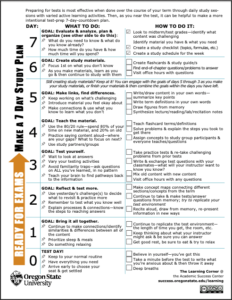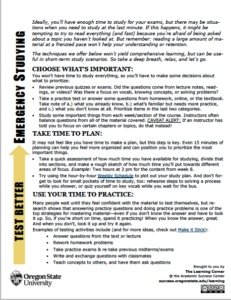As we head into the last few weeks of the terms, students are preparing for final exams. While the study process and exams might look different this term, there are still many tools to help students prepare. Here are recommendations from our student staff based on what works for them and what they share with students who access ASC programs. Click on the visual to see the full-size version of each tool.
Term at a Glance
Maria, ASC Strategist
One of my favorite tools is the Term at a Glance worksheet. It allows me to visualize my midterms, final exams, quizzes, and large projects all in one place. It also prompts me to start on projects earlier, rather than putting them off until the last minute. Especially now, with the days of the week blurring together, being able to see when important projects and essays are due helps me to stay on track. I feel accomplished when I can cross off assignments that I have completed.
Finals Survival Guide
Hana, ASC Strategist
The Finals Survival Guide is incredibly useful for getting a head start on finals. Inside the packet, there is a large calendar [with] weeks leading up to final exams, so students can break down everything they need to do in order to feel fully prepared and confident going into finals. Along with the calendar, there are study tips and advice for how students can succeed in the last phases of their classes.
7 Day Study Plan
Theresa, Academic Coach
My favorite resource is the 7 Day Study Plan. It breaks studying into manageable chunks, so students can make tangible progress while not being overwhelmed. The best part about this worksheet is that it shows what to do each day and how to do it. It also has a page where students can think about what they need to study and how they can create the best study environment. All in all, it is a great starting point for students when it comes to test preparation!
Aarya, ASC Strategist
This tool can be used to plan for exams across various classes. I have been able to utilize it within STEM courses, writing-intensive courses, hybrid courses, and more. This worksheet has been especially helpful in the online learning environment because I can organize what materials I need, what I know, and what I need to know for an exam. The checklist feature is also helpful for keeping me accountable as I study throughout the seven day period.
Test Autopsy
Hana, ASC Strategist
The test autopsy worksheet is great for students who may not have done as well on a test as they would have liked. It creates a structured approach to evaluating their performance on a test. Instead of taking the grade they received as a testament of their entire understanding of a subject, the student can review each question to identify why they didn’t get an answer right. This allows the student to see exactly which areas they could put more energy and time into studying.
Studying Checklist
Hoan, ASC Strategist
My favorite tool to use when preparing for exams is the Studying Checklist. This worksheet is great for summarizing important concepts and ensuring all of the topics will be mastered prior to the exam. It’s a great tool for students who have several challenging courses to keep up with. Seeing a broad overview of concepts will help students think about how to set up their study schedule. With this worksheet, students can plan their studying time based on the levels of learning needed for each concept: remembering, understanding, applying, and mastering.
Emergency Studying
Bo, ASC Strategist
My go to tool for studying is the Emergency Studying worksheet. I find that the term gets busy fast. [W]hen it comes to studying, I want to figure out the best use of my time. This tool helps me focus on what’s most important. [I]n doing so, I am able to create a study guide [and] a plan for how much time to spend studying each day leading up to the test. I’ve found that the Emergency Studying worksheet is beneficial no matter how much time I have before a test.







